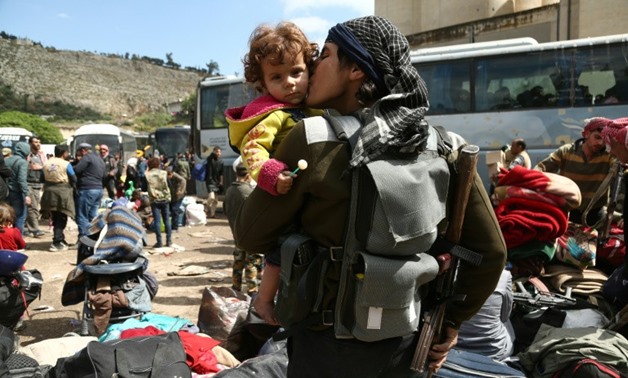
A rebel fighter from Eastern Ghouta, holds his weapon as he kisses a child after arriving in Qalaat al-Madiq, some 45 kilometres northwest of the central city of Hama, on March 30, 2018, following the ongoing evacuation deals
- AFP
SYRIA - 1 April 2018: Syria's army promised Saturday to finish off fighters in the final opposition holdout of devastated Eastern Ghouta outside Damascus after a penultimate pocket was declared "empty" of rebels.
Russia-backed regime forces have recaptured the vast majority of the enclave through the combination of a deadly air and ground assault and evacuation deals.
After a six-week blitz the only remaining scrap of rebel-held territory centres on the main town of Douma, but Moscow-brokered talks over a possible evacuation have stalled as the group controlling it has pledged to stay put.
Syria's army vowed it would now press on with "fighting in the area of Douma to rid it of terrorism", using the term it usually uses to refer to rebels.
The announcement came shortly after state news agency SANA reported another rebel area was "empty of terrorism" as the last buses carrying rebels and civilians left it on Saturday afternoon as part of a deal to withdraw.
More than 41,000 people have been bussed out of the southern pocket held by the Faylaq al-Rahman rebel group in over a week under the Russian-supervised agreement, according to a tally of state media figures.
"It's a strategic victory against terror and a turning point" in the battle for Eastern Ghouta, an army officer told state television as soldiers around him celebrated.
As of Saturday, regime forces supported by their Russian allies had retaken 95 percent of Eastern Ghouta, the Syrian Observatory for Human Rights said.
- Refusal to leave -
The assault on Ghouta has killed more than 1,600 civilians since February 18 and seen tens of thousands more flee the fighting into regime-held areas, the Britain-based monitor says.
Troops have pursued a divide-and-conquer strategy, seizing most of the enclave then breaking up what was left of it into three isolated pockets.
In total, more than 45,500 people have left Eastern Ghouta under evacuation deals from the two first pockets.
Now Jaish al-Islam are the only rebels left clinging on to their turf after the others were sent packing.
The head of Jaish al-Islam's political office, Yasser Delwan, said late Saturday that talks over Douma's fate were ongoing.
"But we still haven’t reached an agreement," he said, however describing the atmosphere of the negotiations as "positive".
- 'Beating heart of the rebellion' -
On Friday, Russia's defence ministry said it had brokered a deal that would see rebels abandon Douma "shortly", but the fighters denied it immediately.
Jaish al-Islam had been angling to reach a settlement with the Russians whereby they could stay.
But negotiations faltered over the group's demands of a general amnesty and unrestricted movement for Douma residents across the country, a source with knowledge of the talks told AFP.
Moscow threatened Jaish al-Islam with a renewed assault on the town if they did not agree to withdraw, and Syrian troops have amassed around the holdout.
With the offensive on Eastern Ghouta, President Bashar al-Assad has sought to secure his capital Damascus, which was within mortar range of the rebel enclave.
Last week, a rebel rocket attack on the capital killed 44 civilians.
Assad's forces retaking Eastern Ghouta would be a considerable victory in Syria's seven-year war, which has killed more than 350,000 people and displaced millions.
Syria's civil war started in 2011 with the brutal repression of anti-government protests.
Eastern Ghouta is the "beating heart of the rebellion near Assad's capital," said analyst Nick Heras, a fellow at the Center for a New American Security.
"When Assad stops that heart from beating, he eliminates the greatest threat to his rule in Damascus."


Comments
Leave a Comment